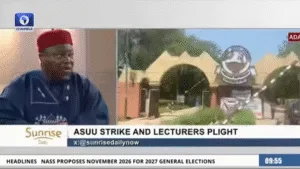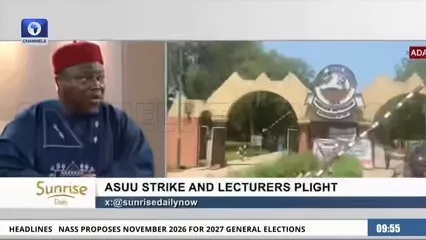On a humid October morning, lecture halls across Nigeria’s public universities sit eerily empty. Students wander campus lawns in restless silence, while lecturers stay home in quiet protest. The Academic Staff Union of Universities (ASUU) has once again declared a nationwide strike — a familiar, painful déjà vu for millions of Nigerians.
This latest action, led by ASUU President Prof. Chris Piwuna, is a two-week warning strike to press home long-standing demands for fair pay, better funding, and respect for previous agreements. The government, however, insists it has already met most of those demands and is enforcing its “no work, no pay” policy. In between, students — the real victims — wait in uncertainty, their dreams on pause.

Table: Key Information on ASUU Strike (for WordPress)
| Field | Information |
|---|---|
| Organization | Academic Staff Union of Universities (ASUU) |
| Current National President | Prof. Chris Piwuna (Consultant Psychiatrist, University of Jos) |
| Nature of Strike | Two-week nationwide warning strike (October 2025) |
| Key Demands | Implementation of 2009 ASUU-FG Agreement, release of withheld salaries, revitalization funds, autonomy for universities |
| Government Response | Enforcement of “No Work, No Pay”, partial release of N50bn Earned Academic Allowances, promise of more in 2026 budget |
| Affected Institutions | UI, UNIBEN, UNIJOS, UNN, FUNAAB, OAU, and others |
| Reference | BBC News – ASUU Strike |
The recurring ASUU strike has become almost ritualistic — like the rainy season. Every few years, classrooms fall silent, students go home, and the same headlines resurface: “Talks Deadlocked,” “No Work, No Pay,” “ASUU Holds Firm.”
But beneath the politics lies a deeper tragedy — a generation slowly losing faith in public education. Every shutdown pushes students further behind, delays graduations, and worsens Nigeria’s brain drain. Some students have spent six years studying for a four-year degree. That’s not education; that’s endurance.
The government argues it has already released billions in allowances and infrastructure funding. ASUU, on the other hand, claims that promises are often paper-deep — signed but rarely implemented. The result? Mistrust so deep that even genuine efforts are doubted.
At the heart of the crisis is a simple question: what is the real value Nigeria places on knowledge? Countries like Kenya, Ghana, and South Africa face similar pressures but manage disputes through continuous dialogue and structured arbitration. In Nigeria, each crisis begins from zero — no monitoring, no enforcement, no lasting framework.
ASUU’s grievances aren’t just about pay; they’re about survival. Many lecturers teach in poorly equipped classrooms, with outdated lab tools and overcrowded halls. Some have gone months without pay. For them, striking feels less like rebellion and more like self-defense.
Yet, strikes also carry collateral damage. Students’ morale sinks, parents lose faith, and the global reputation of Nigerian universities takes another hit. Employers now quietly admit they avoid hiring fresh graduates from certain institutions because of disrupted calendars and half-completed semesters.
But hope isn’t lost. The path forward requires less confrontation and more collaboration. Nigeria can learn from nations that turned academic crises into reforms. Establishing a Joint Education Accountability Council — with representatives from ASUU, the government, students, and independent experts — could ensure transparency and continuous negotiation instead of cyclical breakdowns.
Funding, too, must evolve. Universities need autonomy to generate and manage resources while the federal government guarantees a steady base fund. Performance-based grants could reward schools that improve research output, student welfare, and innovation.
And finally, communication matters. By publicly tracking progress — publishing real-time reports on budgets, salaries, and projects — both sides can rebuild trust. When people see transparency, suspicion fades.
In truth, this strike, like others before it, exposes both pain and potential. Nigeria’s universities remain filled with brilliant minds — students eager to learn, professors devoted to their calling. But brilliance without stability is wasted light.
If this season of silence becomes the catalyst for real reform, it will mark a turning point. The ASUU strike should not just pause education; it should provoke transformation.
As one student in Ibadan put it recently, “We’re not just waiting for lectures to resume. We’re waiting for Nigeria to remember that education matters.”
Maybe that’s the message in this strike — not rebellion, but a plea for renewal. Because if the country listens now, perhaps the next time classrooms fall silent, it won’t be from another strike, but from students concentrating — learning, believing, and building the future Nigeria deserves.

